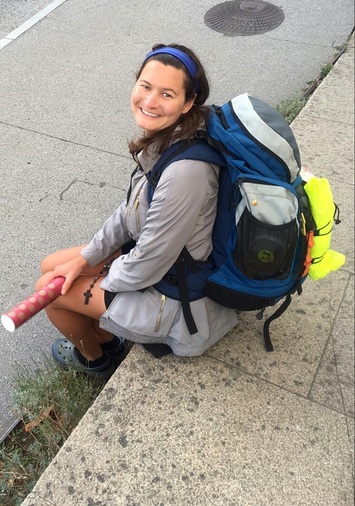 Maggie Tuttle, clutching her Camino completion scroll at journey's end. She persevered on the Way with blisters covering both feet (totaling 18 at one point)."
Maggie Tuttle, clutching her Camino completion scroll at journey's end. She persevered on the Way with blisters covering both feet (totaling 18 at one point)." But one theme kept recurring in our final conversation on the Camino: our capacity to continue when we knew we couldn't continue. For some, the first few hours were the hardest. Martin suffered multiple blisters such that he could hardly make it to the bathroom upon waking up. "How is it possible for me to carry my pack up steep hills for the next ten hours?" he wondered. "I will have to use a cab today," he concluded. But even though he couldn't do it, he did it. Somehow God gave him the capacity. The last few hours were my hardest. Once we stumbled into a village only to learn all the beds were taken. We would have to walk another hour to the next village, hoping something there would be available. My feet were two swollen water balloons, a golfball-sized lump had developed on my shoulder under the pack strap, my strength was simply dried up, and the psychological dismay of not knowing if there would be any beds in the next village deadened me. But God put one of my feet in front of the other, and we kept going.
We began to realize that we don't actually have to finish the walk--in fact, we can't. We only had to allow God to finish the walk for us. Christ's words in Matthew 19 became wonderfully real: "for man it is impossible [referring to marriage], but not for God. For God, all things are possible." The Camino is God's, and we can only follow, only surrender to His grace. It was not easy, but it was possible. Possible, though, only for the one who in fact surrendered, taking no account of the personal sacrifice, believing only that God does not command what He does not give the grace to accomplish. By the grace of God, 15 of us hobbled into Cathedral Square on the morning of Aug 31, and a group of tourists or pilgrims, standing beside their bus, clapped. They were not clapping for us, however, since we didn't do the walk, but clapping for the Savior, who made the walk with and for us.


 RSS Feed
RSS Feed